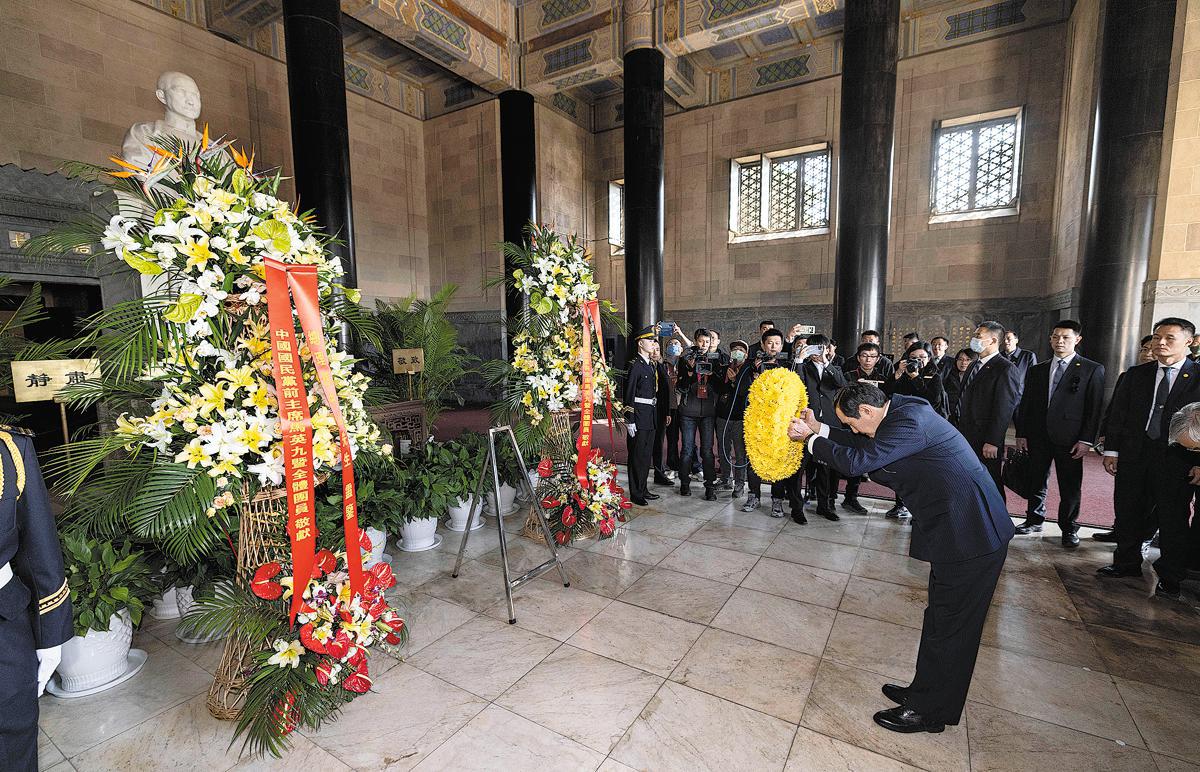Ma Ying-jeou visits Sun Yat-sen Mausoleum in Nanjing
China Daily2023-03-29 11:29
 Ma Ying-jeou, former chairman of the Chinese Kuomintang party, presents a wreath at the statue of Sun Yat-sen, founder of the KMT, at the Sun Yat-sen Mausoleum in Nanjing, Jiangsu province, on Tuesday. Ma began his 12-day visit to the Chinese mainland on Monday. CAI YANG / XINHUA
Ma Ying-jeou, former chairman of the Chinese Kuomintang party, presents a wreath at the statue of Sun Yat-sen, founder of the KMT, at the Sun Yat-sen Mausoleum in Nanjing, Jiangsu province, on Tuesday. Ma began his 12-day visit to the Chinese mainland on Monday. CAI YANG / XINHUA
People on both sides of the Taiwan Straits belong to the Chinese nation and share the same ancestors, and the two sides should work together to achieve the revitalization of the nation, a former chairman of the Chinese Kuomintang party said on Tuesday.
Ma Ying-jeou made the remarks during a visit to the Sun Yat-sen Mausoleum, the final resting place of Sun Yat-sen, the forerunner of China's democratic revolution, on Tuesday in Nanjing, Jiangsu province.
Ma is leading a group of Taiwan students for communication and exchange activities on a 12-day visit to the Chinese mainland, which started on Monday. He will pay respects to his ancestors on the occasion of Qingming Festival, which falls on April 5.
At the mausoleum, Ma and a group of visitors from Taiwan paid tribute to Sun, the founder of the KMT. Sun led the Revolution of 1911 that brought down the Qing government, ended the absolute monarchy that had ruled China for thousands of years, and paved the way for the profound social changes that have taken place in modern China.
His revolutionary spirit has inspired generations of Chinese people to strive for national independence and dignity. Sun was widely regarded as a great national hero, a great patriot and a pioneer of the country's democratic revolution.
Sun fought staunchly against feudal autocracy and was the first to call for "the revitalization of China".
Sun once noted that "reunification" is the hope of all Chinese people. He had always firmly safeguarded national reunification and unity and taken a clear-cut stance against words and actions aimed at splitting China and the Chinese nation.
In commemoration of Sun, Ma wrote an inscription at the site advocating peace and efforts for the nation's revitalization.
He told reporters after the visit that he sincerely hopes both sides of the Straits will join hands in pursuing peace, avoiding war and striving for the nation's revitalization, Xinhua News Agency reported.
"This is an unavoidable responsibility of the Chinese people on both sides of the Straits, and we will work hard to realize it," he said.
Ma also said that young people in Taiwan, a group of whom joined him at the mausoleum on Tuesday, should have an in-depth understanding of Sun's life and cross-Straits relations, and realize that only through peace and hard work can the two sides revitalize the nation.
"During our trip, we feel the hospitality of our mainland friends and people welcoming us. We will convey this kindness to the people in Taiwan when we return," he said.
Liu Xiangping, a professor of Taiwan studies at Nanjing University, said that Sun's lifelong efforts in pursuing national unification and revitalization are admired by all Chinese, and his aspiration of revitalizing the nation should be the common pursuit of compatriots on both sides of the Taiwan Straits.
Li Zhenguang, a professor of Taiwan studies at Beijing Union University, said that although the two sides of the Straits are yet to be reunified, the fact that both the mainland and Taiwan belong to one and the same China has never changed.
China's sovereignty and territorial integrity have never been divided, and brook no division, Li said.
The mainland advocates resolving contradictions and differences between the two sides through dialogue and negotiation in the process of moving toward peaceful reunification under the one-China principle, he added.
